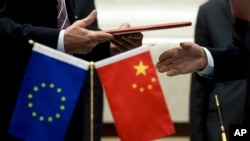The European Union is unlikely to lift some trade barriers on China later this year because of worries that Chinese exports will lead to job loss in member nations.
That is what the European Chamber of Commerce in Beijing said in a report announced Monday.
Earlier this month, workers representing trade unions in 17 countries demonstrated in Brussels. Some carried signs that read: “Stop China Dumping” and “Say No to MES for China.” MES means Market Economy Status.
The unions blame both China and Russia for creating job losses. Job growth in Europe has been slow for 19 straight months up to last December.
Joerg Wuttke is president of the European Chamber of Commerce in China. He says unrest is making it extremely difficult for European politicians to support China’s request for being granted the status of a market economy.
Dumping of goods is one concern
The European Parliament has discussed China’s market economy status request. If it is granted, the move would reduce trade barriers and make it easier for Chinese exports flow to Europe.
Critics warn that could lead to the dumping of goods at unfairly low prices. In trade, dumping is defined as selling a product in a foreign country at below its price at home.
“My personal observation of the parliament is that it is pretty much unified that China is challenging jobs in Europe and it doesn’t matter whether you are a north or south (of Europe) parliamentarian, you are pretty much against it,” Wuttke said.
The group says Chinese companies have machine overcapacity and low demand. Companies have tried to export surplus steel, which has pushed down global prices. Factories in Europe have closed.
It has also resulted in a growing number of anti-dumping investigations into Chinese products, the European business group said.
Job losses remain a worry in EU and China
The European Chamber of Commerce released a report entitled, “Overcapacity in China.” Wuttke said researchers estimate job losses in Europe could be between 100,000 and 10 million.
However, China needs to export more goods to save jobs at home. The group of countries that make up the European Union is China’s biggest trade partner. But, the EU has introduced anti-dumping cases that can block the flow of Chinese goods.
China has been open about the problem as it has offered a plan to close down so-called “zombie” corporations. These companies continue to make more than they sell, and keep workers on wage rolls though their machines are idle.
The government’s plans include cutting 100 million to 150 million tons of low-end steel capacity and 500 million tons of coal production.
But the government is reluctant to follow through on its own plans because of the massive job losses that would follow. Preserving jobs remains a key concern.
Last year, a state-owned coal company laid off 100,000 workers over a three-month period. Hundreds of thousands in the coal and steel sector could lose their jobs in the coming months.
Government still supports growth
Wuttke said some government agencies are encouraging some businesses to grow even as they struggle with overcapacity.
According to the chamber, only one of the eight industry sectors it studied was not affected by overcapacity. All others were suffering from extremely low demand for the amount of goods they can produce.
Regional governments and local banks are encouraging such companies because they continue to chase economic growth. They are also blocking mergers and acquisitions because they are worried about the tax losses that could bring.
I'm Mario Ritter.
Bill Ide and Saibal Dasgupta reported on this story for VOANews.com. Mario Ritter adapted their report for Learning English. Kathleen Struck was the editor.
_____________________________________________________________
Words in This Story
overcapacity –n. the situation in which a company or industry produces more of something than it can sell
dilemma –n. a situation in which you have to make a difficult choice
idle –adj. not being used, not working
challenging –adj. difficult, often in a way that can be rewarding
encouraging –adj. causing a hopeful feeling
sectors –n. a part of the economy
merger –n. the act of combining two or more businesses
acquisition –n. when a business buys or acquires another business





